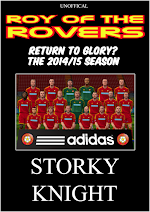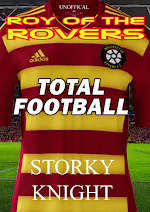GK - Shorty Stubbs (1968)
As his nickname suggests Stubbs was too short to be a decent goalkeeper. Remarkably he kept 4 clean sheets in 7 unbeaten games as Rovers won the Championship in 1967-68. But this was rather down to luck than skill, with the entire Rovers team on edge, missing Tubby Morton and offering extra cover for the rookie goalie.
 |
| Shorty Stubbs blunders gifting an easy goal |
Thrust into the limelight with a debut against rivals Melboro', young Walter was out of his depth. Roy was kind to the kid, but was petrified to the point of nightmares with the idea of picking him. Walter made sporadic first team appearances in the next 4 years, but never convinced. His error in the Cup Final of 1984 nearly cost his team the win.
 |
| Bridger's nightmare start in the 84 Cup Final |
RB - Errol Bridger (1984)
The teenager made his Rovers debut on the biggest stage, the 1984 FA Cup Final and had a nightmare. His unsteady performance was so uninspiring that he never appeared for Rovers again.
Alternative - Mark Giles (1993-96)
Giles was part of the infamously awful Rovers side of the mid-90s. A versatile defender or midfielder he was one of the poorer members of a very poor side.
CB - Vic Guthrie (1979-86)
After the retirement of Lofty Peak, Roy was desperate to add more height to his defence. Controversially, Roy signed Guthrie from Second Division Westbury Town. The defender had a reputation for foul play and his rough style went against Rovers' traditions. While Rovers would go on to win the title that season, the next was a farce as one of the worst post-war Rovers XIs were relegated. Guthrie's inconsistent performances were a key part of that failure. While Rovers recovered to dominate the Second Division it was largely without Guthrie as suspension and suspicion led to his exclusion from the team until the final match of that promotion season.
 |
| Superbrat Vic Guthrie punches out an opponent |
CB - Alex Ritchie (1990-93)
The young Scot became a first team regular in the disappointing 1990-91 campaign. Roy knew he was a weak link and eventually decided to seek a replacement after a dreadful performance against Third Division Brentfield. Uncertain and nervous, Ritchie never regained a first team place once the formidable Karl Bruckner was signed.
 |
| One of Alex Ritchie's many blunders |
Peters and his pal Cassidy were considered important squad members in the late-70s, however most Rovers fans would cringe at the sight of either in the first XI. The pair were also troublemakers and one time contract rebels. Peters' retro-Beatle hairstyle and Cassidy's silver barnet were the only stand out features of this couple of sub-par Rovers footballers.
LB - Steve Naylor (1980-86)
Another part of the terrible Rovers defence of 1980-81. Naylor was originally a midfielder, but Roy converted him to centre-back. Naylor eventually moved to left-back with Duncan McKay switching to the centre. Naylor offered no threat in attack, was slow and dithering in possession. A more competent centre-back, but a very poor left-back.
Alternative - Steve Clark (1993-96)
Part of the worst Rovers team since the war, Clark was never good enough for Melchester Rovers. Able to also play on the left wing and as wing-back, Steve had no flair or speed. His defensive abilities were suspect and while he wasn't helped by the constant changing of formation and tactics under Blackie Gray and Mervyn Wallace he never showed anything to suggest he would ever be a capable first team member.
CM - Nat Gosden (1980-84)
Grandad was signed from Oldfield in the 1980-81 season as a replacement for the phenomenal Geoff Giles. While more decorated, with 47 England caps, Gosden was a massive disappointment and nowhere near the standard of Giles. While Giles thrived and even improved at Melboro', Gosden plodded along offering little quality in the Rovers midfield and later in defence. While a fans favourite, nobody can deny that Nat Gosden did not have many even good performances for Rovers and for a player of his perceived ability that is a poor effort.
CM - Doug Ballard (1968)
The well-traveled Ballard became Rovers record transfer after he joined from Carford early in the 68-69 season. Doug quickly proved himself unpopular with his team-mates. He was selfish, unreliable and flashy, three things that no Rovers player should ever be. In a European Cup contest against Shevnik Sparta, Ballard was given a torrid time by star player Kezakov. The tricky playmaker outplayed Ballard to the point where the Rovers man feigned injury to escape his tormentor. Roy soon outed Ballard and the record signing was on his way to another new club.
 |
| Ballard goes down, pretending to be hurt |
Cracker's game was never short of effort, but was short in pretty much every other area. Son of the legendary Blackie, Mark was never near emulating his father is either skill or longevity. Cracker lacked discipline, often in trouble with referees for his overzealous tackling and at times with management for his failure to hold his position. Cracker was dropped into the first-team after the Basran disaster and kept a place at the centre of the Rovers midfield in spite of his inconsistent and often underwhelming displays. Cracker lost his place in the 1989-90 season after the emergence of Terry Spring, the difference between the two players in terms of quality really showed just what a poor midfielder Cracker really was.
 |
| Cracker Gray is sent-off after giving away a needless penalty |
Undoubtedly once a superbly talented footballer, the Brazilian legend, Malandro showed little sign of that international class at Melchester. The classic football phrase, "Could he do it on a cold Tuesday night in Eastoke?" was made for Malandro. Seen in gloves, collar turned up, shivering while misplacing pass after pass, Malandro was the ultimate underachiever and another part of Mervyn Wallace's awful Rovers relegation team.
 |
| Misplaced passes from Malandro were a common sight |
Roy saw Dixon as a forward who would allow Rovers to change up their tactics and adopt a more direct style. Signed from Kingsbay in what was described as a bargain £60,000 deal, Roy soon discovered that Roger had a major problem; he had absolutely no stamina. Dixon refused to accept a part-time role as super-sub and made no secret of his desire to move on. There were no takers until the controversial double transfer of Geoff Giles and Dixon to Melboro' early in the 1980-81 season. Dixon was not missed.
 |
| Iconic moment as Roger Dixon lies passed out through exhaustion |
While an absolute superstar of a footballer, Harold "Wonder" Mann makes the list because he almost ruined the career of Roy Race. Under the direction of his evil manager, Mann attempted to discredit Roy and take his place as captain of the Rovers. Eventually his scheme was rumbled and Rovers lost one of the most gifted footballers of the era.
Have your say on my choices below? Do Guthrie, Cracker and Gosden really belong in an all-time bad Melchester Rovers XI











0 Comments